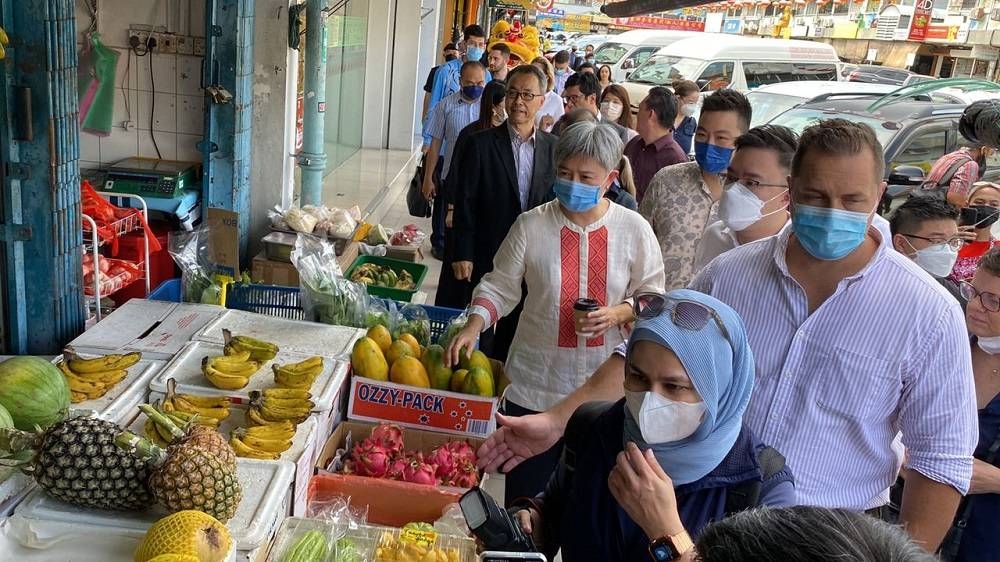KOTA KINABALU, June 30 — Australian foreign minister and senator Penny Wong reconnected today with the city where she was born, Kota Kinabalu, after an absence of five years.
She spent quality time with her younger brother, James — affectionately known as “Peng” — at one of the family’s favourite breakfast haunts.
They started the day tucking into a much-missed bowl of rice porridge with fish paste balls at Kuo Man, a 45-year-old noodle shop in Sunny Garden, Jalan Tuaran, not far from her family home in Likas.
“I used to come here with my dad a lot. We continued coming here on my visits back. This is actually the first time I’m here without dad,” she told her entourage, members of the Australian and Malaysian media as well as Australian government officials.
Surrounded by cameras and curious onlookers, Penny and James were served plates of noodles, fish balls, beef balls and other hawker specialties as they reminisced about their childhood and memories of their father.
“Oh, the ham chin peng here is good too... remember?” said James as he gave his sister a friendly nudge.
“I seem to remember everyone liked it more than me,” she laughed as she explained the savoury pastry to those in her entourage who were unfamiliar with it.
Wong then tucked into a steaming bowl of congee, which she called “jook” and ordered a cup of teh O kosong.
She also recalled how their father would wake her up at 5am for trips to the market for the best selection of fresh fish before going for breakfast at Kuo Man.
“For us, this was how we got to spend meaningful time with dad one-on-one,” said James, an architect who is the only Wong sibling still living in Kota Kinabalu.
Their father, Datuk Francis Wong, who is now retired and living in Australia, was a prominent local architect.
Later, the pair managed to slip away to visit their paternal grandmother’s grave at the Buddhist cemetery in Mile 5, Tuaran Road, where they laid a wreath and said prayers.
Penny has often spoken about her beloved “poh poh” who singlehandedly brought up her children after World War II, and how she continues to draw strength and inspiration from her.
She later told students at Kinabalu International School (KIS) where she had once studied that she wished she had more time on this trip to visit other places that she missed.
“I wish I could have gone to Tanjung Aru beach and up to Kundasang, Mount Kinabalu, but I have to be back in Australia tomorrow morning,” she said, as James told the crowd that she had climbed the mountain seven times.
Penny also told the students that she was more sports-inclined than into studies, preferring to run and swim.
“It was only in Australia that I started paying attention in school,” she said, adding that Bahasa Malaysia was not her forte while in Sabah.
When asked by a young student how she got into politics, Penny said she was driven by her experiences as a young migrant to Australia when the country had not come to terms with its diversity.
“Most of us want a sense of purpose in life, and that could be a lot of different things. I left for Australia in 1976 and it was not so diverse then.
“I think the experience of being different, having some experiences and hearing some things, I felt like I wanted to change things.
“Some people teach, some people design buildings, so I felt like I could change the way things were. It’s important that we have a sense of purpose,” she said.
Penny spent three years at KIS, between the ages of five and eight, before leaving for Australia with her mother.
Her father was also involved in designing the original school building.

Wong also visited the Chinese community in Foh Sang today, accompanied by Luyang assemblyman Ginger Phoong, where she was greeted by a lion dance troupe before walking around the coffee shops, grocery stores and traditional Chinese medicine stores, among others.
“I think the last time I came here was to grocery shop with my dad,” she said to the media.
Many of the residents whom Malay Mail spoke to said they were aware of her, having read about her in the news and proclaimed their pride at having someone who was born in Sabah make it big in politics in Australia.
“She is a source of pride for Sabahans,” said one shopkeeper who only wanted to be known as Lai.
Wong’s history and background have been heavily reported during her long political career, but this is her first visit back to her hometown since becoming Australia’s foreign minister.
She has often said that her story as a migrant in Australia is not unique, but common as one-in-two Australians share a similar story.



















